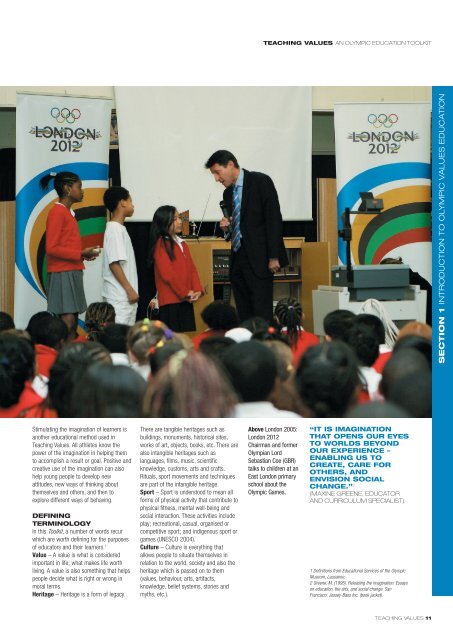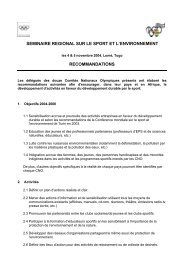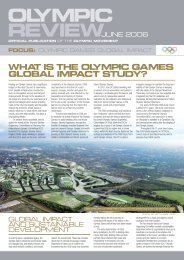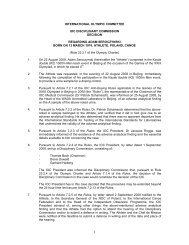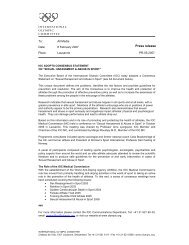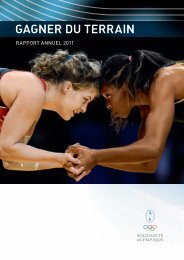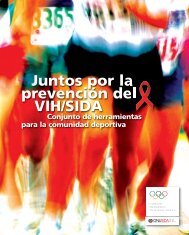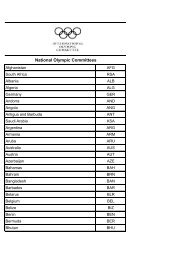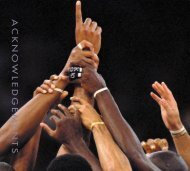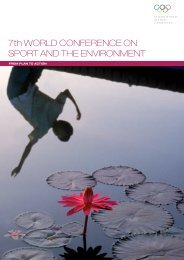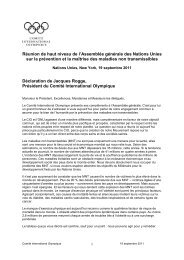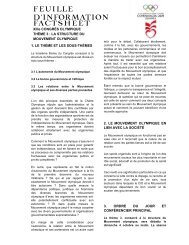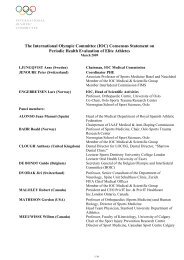Teaching Values- An Olympic Education Toolkit - International ...
Teaching Values- An Olympic Education Toolkit - International ...
Teaching Values- An Olympic Education Toolkit - International ...
Create successful ePaper yourself
Turn your PDF publications into a flip-book with our unique Google optimized e-Paper software.
TEACHING VALUES AN OLYMPIC EDUCATION TOOLKIT<br />
SECTION 1 INTRODUCTION TO OLYMPIC VALUES EDUCATION<br />
Stimulating the imagination of learners is<br />
another educational method used in<br />
<strong>Teaching</strong> <strong>Values</strong>. All athletes know the<br />
power of the imagination in helping them<br />
to accomplish a result or goal. Positive and<br />
creative use of the imagination can also<br />
help young people to develop new<br />
attitudes, new ways of thinking about<br />
themselves and others, and then to<br />
explore different ways of behaving.<br />
DEFINING<br />
TERMINOLOGY<br />
In this <strong>Toolkit</strong>, a number of words recur<br />
which are worth defining for the purposes<br />
of educators and their learners. 1<br />
Value – A value is what is considered<br />
important in life; what makes life worth<br />
living. A value is also something that helps<br />
people decide what is right or wrong in<br />
moral terms.<br />
Heritage – Heritage is a form of legacy.<br />
There are tangible heritages such as<br />
buildings, monuments, historical sites,<br />
works of art, objects, books, etc. There are<br />
also intangible heritages such as<br />
languages, films, music, scientific<br />
knowledge, customs, arts and crafts.<br />
Rituals, sport movements and techniques<br />
are part of the intangible heritage.<br />
Sport – Sport is understood to mean all<br />
forms of physical activity that contribute to<br />
physical fitness, mental well-being and<br />
social interaction. These activities include<br />
play; recreational, casual, organised or<br />
competitive sport; and indigenous sport or<br />
games (UNESCO 2004).<br />
Culture – Culture is everything that<br />
allows people to situate themselves in<br />
relation to the world, society and also the<br />
heritage which is passed on to them<br />
(values, behaviour, arts, artifacts,<br />
knowledge, belief systems, stories and<br />
myths, etc.).<br />
Above London 2005:<br />
London 2012<br />
Chairman and former<br />
Olympian Lord<br />
Sebastian Coe (GBR)<br />
talks to children at an<br />
East London primary<br />
school about the<br />
<strong>Olympic</strong> Games.<br />
“IT IS IMAGINATION<br />
THAT OPENS OUR EYES<br />
TO WORLDS BEYOND<br />
OUR EXPERIENCE –<br />
ENABLING US TO<br />
CREATE, CARE FOR<br />
OTHERS, AND<br />
ENVISION SOCIAL<br />
CHANGE.” 2<br />
(MAXINE GREENE, EDUCATOR<br />
AND CURRICULUM SPECIALIST)<br />
1 Definitions from <strong>Education</strong>al Services of the <strong>Olympic</strong><br />
Museum, Lausanne.<br />
2 Greene, M. (1995). Releasing the imagination: Essays<br />
on education, the arts, and social change. San<br />
Francisco: Jossey-Bass Inc. (book jacket).<br />
TEACHING VALUES 11


